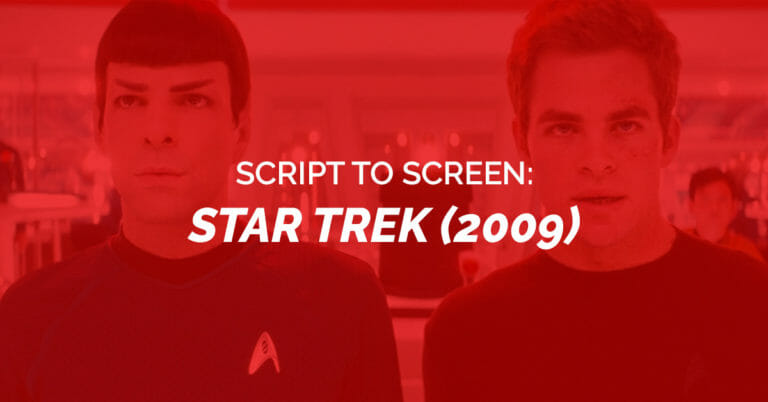Sign up for the
TSL Newsletter
and get $50 off Final Draft 12
By Christopher Osterndorf · June 9, 2018

For many, Star Trek is the holy grail of science fiction franchises. Filled with “hard sci-fi” touches left out of more fantastical series (*cough cough* Star Wars *cough cough*), the universe is also defined by its exploration of complex moral dilemmas and its deeply human characters — many of whom aren’t human at all.
In 2009, writers Roberto Orci and Alex Kurtzman (Transformers, Fringe) were given the difficult job of writing the screenplay for J.J. Abrams reimagining of the original series. Despite the daunting expectations of fans and the challenge of adapting the material for a modern audience, they passed this test with flying colors. Orci and Kurtzman have since carried the sensibility they established in 2009’s Star Trek through two sequels and the CBS All Access show, Star Trek: Discovery.
Without ever losing the original show’s sense of pathos, Orci and Kurtzman brought Gene Roddenberry’s beloved creation into the 21st century by injecting some much-needed levity into the franchise and subverting traditional notions about what Star Trek could be. The scene below, which depicts a confrontation between Spock and not-yet Captain James Tiberius Kirk is a perfect example of how they were able to “make it so.”
From the very first beat, we can see this is a tense scene. Kirk and Spock are clearly approaching a confrontation Yet when Spock begins to question Mr. Scott, he clumsily responds with, “I’d rather not take sides.”
The writers throw Scotty in here to alleviate some of the tension in the scene right off the top. It’s a perfect example of how Orci and Kurtzman find ways to make their version of Star Trek fun and comedic, even in between its most serious moments. By breaking up the tension with humor, the audience never feels weighed down by everything else going on.
Genre fiction can be tough to get audiences to buy into. Finding a way to sell people on a universe with green women and tribbles without being winking or meta isn’t easy. Yet Orci and Kurtzman make Star Trek fun for non-science fiction fans and diehards alike by using jokes which anyone can relate to.
Part of the reason this scene works is that fans know Kirk and Spock’s history. They’re aware that Spock tries not to show emotion, and they’re also aware that Kirk will try to play off that.
More importantly, they know that Kirk and Spock are friends. Even as it quickly becomes clear where this scene is going, the impact of their fight is not lessened. This scene shows how Orci and Kurtzman were able to subvert the expectations of their fan base, while also satisfying them. Kirk is as brash and reckless as ever here, and Spock is as logical and cold as ever. But as the tension builds and Kirk goads Spock into a confrontation we know is coming, it’s still completely devastating. We want Kirk and Spock to be friends, but the truth is that the original Star Trek played off their differences just as much as they played off what they have in common. In this way, Orci and Kurtzman find a way to stay true to the roots of the roots of the characters, while also reminding us that they’re more than one-dimensional archetypes.

The scene culminates in a moment of violence that demonstrates just how far Spock has been pushed. Given what we know about his character, the confrontation is significant, as it violates all the principles he purports to uphold.
Orci and Kurtzman use their prose to indicate just how seismic a shift this is for Spock. They describe in detail how he, “fucking DELIVERS A SERIES OF POWERFUL BLOWS,” and later that he is, “now fucking CHOKING Kirk.” The scene ends with them writing, “JESUS. Spock just… quit.”

Ultimately, Orci and Kurtzman show that underneath the logical and rational man Spock has always appeared to be, there is an angry, frightened person, who shields his emotions as a way of protecting himself from the world — and vice versa. Similarly, they show how Kirk is more than just a hothead, egomaniac by writing that after Spock finishes beating up on him, “his expression isn’t about spite or hatred… but compassion.”
Most importantly, the scene is a testament to how all confrontations strip back another layer of a character. Which, again, in the case of a well-known property like Star Trek, is pretty important.
 Chris Osterndorf is a freelance writer from Milwaukee who studied cinema at DePaul University in Chicago. When he’s not watching movies, he’s writing them or writing about them. He’s especially partial to romantic comedies and crime films. He currently lives in Los Angeles.
Chris Osterndorf is a freelance writer from Milwaukee who studied cinema at DePaul University in Chicago. When he’s not watching movies, he’s writing them or writing about them. He’s especially partial to romantic comedies and crime films. He currently lives in Los Angeles.
Photo Credit: Bad Robot
For all the latest from The Script Lab, be sure to follow us on Twitter, Facebook, and Instagram.